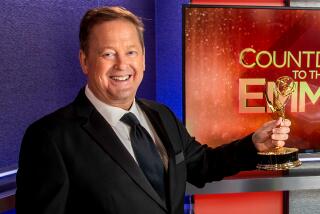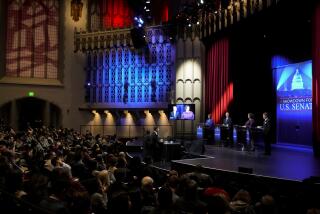Fullerton : Radical Pair From ‘60s Clash in Stinging Debate
- Share via
Jerry Rubin--in his 1980s clean-cut, dark-suit-and-tie look--poured himself a glass of Perrier water while listening to one-time ally and now stage-foe Abbie Hoffman berate Rubin’s “yuppieness” and “designer brains.”
Once symbols of the 1960s radical movement--as members of the Chicago 7 --the two now have different messages for America’s youth.
Rubin: “You can become successful and still care . . . . The Democrats have to become the party of the entrepreneurs . . . . He (Hoffman) is telling people don’t go out and become a success in America.”
Hoffman: “You can’t go out to a black woman in the ghetto with 10 kids and say go out there and invent an Apple computer . . . . I care about actions. Seventy percent of the American people do not want to overthrow the government of Nicaragua. Seventy percent of the American people cannot find Nicaragua on a map.”
Thursday night, they shared their diverse messages at the Pacific Christian College theater during a fiery “Yippie vs. Yuppie: Idealism of the 1960s vs. the Reality of 1985” debate--one that they’ve gone through at about 40 college campuses across the country since last September.
“It was a great show. But there were still important things said--even if it was a show. It’s at least making people in the audience who haven’t experienced that period of time aware of it,” said Cal State Fullerton political science professor Raphe Sonenshein following the conclusion of the debate, a shouting match between the two men that prompted shouts and a spontaneous ovation from many in the audience.
Hoffman was the obvious winner of the debate-turned-show from the sounds of applause for him and jeers for Rubin from the 200 attending the event, sponsored by Cal State Fullerton’s Associated Students Production. Both men received about $1,500 each for the show, Rubin said.
Despite the repeat performances, Rubin, 46, said later that the anger in their sharp, quick and often-funny comebacks are real. “We’re kind of like a divorced couple,” he said.
In 1968, when they were arrested for inciting a riot outside the Democratic National Convention in Chicago, Rubin and Hoffman were a team. But following a prison term, Rubin discovered EST, yoga, health foods, bioenergetics and a smorgasbord of self-awareness programs that led him to become a venture banker on Wall Street and an entrepreneur who created the “Networking Party” for professionals.
Meanwhile, Hoffman, once a clinical psychologist, went undercover with a false identity and successfully spearheaded a grass-roots movement to keep the Army Corps of Engineers from dredging the St. Lawrence Seaway. In 1980, he came forward not as the environmental activist named Barry Freed, but as Abbie Hoffman who was ready to face 1973 cocaine-dealing charges. He was convicted, sent to prison and released a year later.
Today, Hoffman said he is mellower, although that barely comes through in his fast-paced one-liners. “Sure, you mellow with age. There’s more taxes, there’s hemorrhoids . . . .” But his zeal for action is still there as is his dislike for the new breed of young, urban professionals or “yuppies,” he said.
“We had to change,” Rubin said of the 1960s’ radicals who opened up businesses and “began transforming America.” Retorted Hoffman, “This is nothing new. This is the American way of life. We took a look at that and said ‘it’s boring, it’s selfish, it’s shallow. There has to be a better way to live.”
More to Read
The biggest entertainment stories
Get our big stories about Hollywood, film, television, music, arts, culture and more right in your inbox as soon as they publish.
You may occasionally receive promotional content from the Los Angeles Times.










